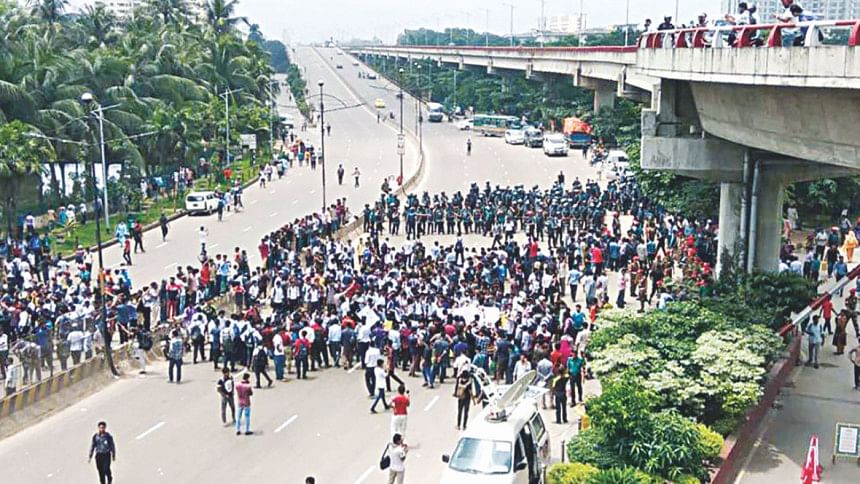Tomorrow People

Children in blue and white uniforms came marching straight towards our cars. Watching them was like watching a sea of protest, meant to sweep us off our shores of comfort. Those trapped in the car had little room to change their direction. It was a one-way traffic leading to the Airport Road. Eventually all of us ended up making a U-turn. The waves could not get to us and instead of us being washed away, they were dispersed.
The day before yesterday, I disappointed myself by being scared of the hundreds who were coming towards the car. They were only children whose rage was to be taken seriously. And then there were parents in pain who wondered whether their children were ever going to be safe in public transports, whether they would at all come back home in one piece. And then there was also Jahangir, Dia's father who has been a bus driver in the Dhaka-Rajshahi-Chapainawabganj route for the last 27 years. He has been wailing non-stop, as one of his three gems had just been crushed under the wheels of a killer bus. His two other children were Riad, a sixth-grader, and his eldest daughter Rokeya, now preparing for her Higher Secondary exams.
In reality, the last incident has triggered the anger of the young and helplessness in us, the older generation. After all, we don't choose to send our children in public transports and we don't set the rules or decide who or how to punish every time we lose people we love to buses, rapes, guns or drugs. In the last one year, we have lost 933 students in road accidents. In about 13 days surrounding Eid festivities, 405 people died. Over the last six months, 2,471 people lost their lives in 2,500 accidents, out of which 317 were women and 326 children, and 5,975 were injured. Most of these accidents were caused by trucks carrying goods to different places in the country.
Some time ago, I was told that a young man that I personally know has just been accused of cybercrime. His posts on Facebook have caught the attention of the authorities and thus he has been called in to explain his position. Apparently his Facebook comments are unacceptable. He has abused the police while commenting on his friend's status. His comments were all about how the police were not pro-people and how they ought to face the general wrath of the public. While the first part of his comment could be subjected to deeper scrutiny, the second part had totally self-invited the attention of the authorities. This young man is a conscientious trainee journalist, who's loved by his colleagues. He is regular and has a perception of current affairs that, I am sure, will be polished with time and experience. In short, the chap is promising. Having a keen interest in law, he is fairly aware of the consequences he may suffer because of what he has done. But maybe, just maybe, he was careless or rather carefree one particular moment and had decided to write what he had written. Thus, perhaps an unconditional apology was the only way out…
This is what we are doing by disallowing dissent. We are wrongly encouraging unmeasured outbursts and then punishing them as we know no better. Rage has taken over the youth and the results have been severe. And I am not referring to cases of roads coming to a halt; I am more in anguish pondering over the manner we are deforming the faces of the Tomorrow People, whom we are no longer able to teach or temper.
Should this happen? No. Almost 48 percent of our current population is below 30 years of age. With this demographic advantage, we ought to optimise hope instead of despair; we ought to teach them the tongue of freedom and not one of chains. With the advancement of technology, we need to realise that they cannot be dampened by water cannons, batons, harassment, lawsuits, imprisonment or torture. If one stops, there will definitely be hundreds more from different corners, echoing the other. Let's not forget there are mountains that host echoes and once the call is out, there's no turning back.
As I write the column, the news of the agitated students demonstrating in Farm Gate intersection is spreading fast. Their nine-point demand includes the resignation of the shipping minister, who had smiled and commented unwisely. If there are lessons to be learnt from history, then let's look at last century's India. Lal Bahadur Shastri, who served as the minister of railways and transport in the Central Cabinet from May 1952 to December 1956, offered his resignation in September 1956 after a railway accident took place at Mahbubnagar that led to 112 deaths. However, Nehru did not then accept his resignation. Eventually, three months later, he resigned as he accepted moral and constitutional responsibility for a railway accident at Ariyalur in Tamil Nadu in which 144 died. Nehru spoke about this in the parliament and explained that he was accepting the resignation because it would stand out as an example in constitutional propriety and not because Shastri was responsible for the accident in any way.
There are rules of propriety that we live by.
Let's not flaunt them ever.
Rubana Huq is the managing director of Mohammadi Group.





Comments